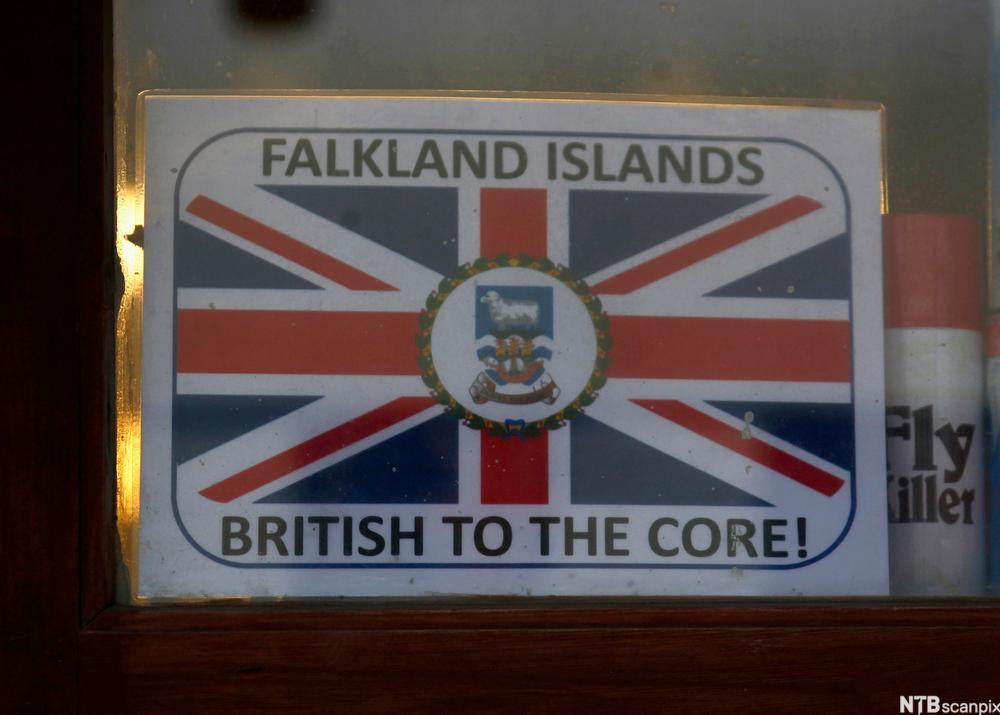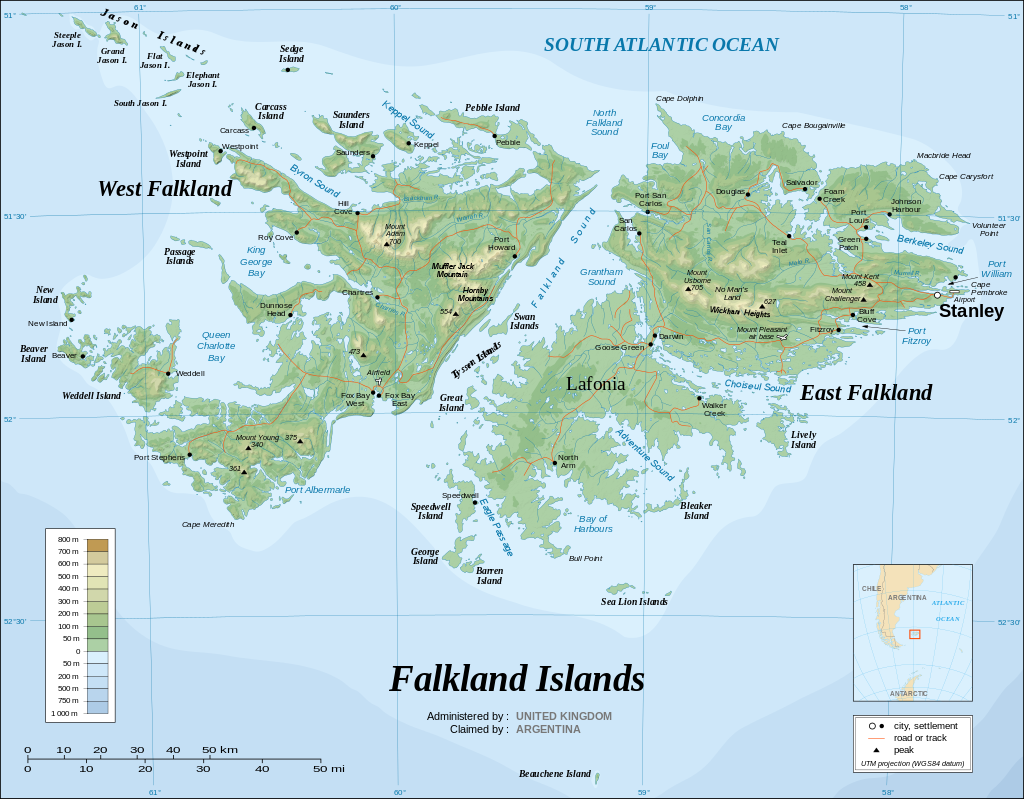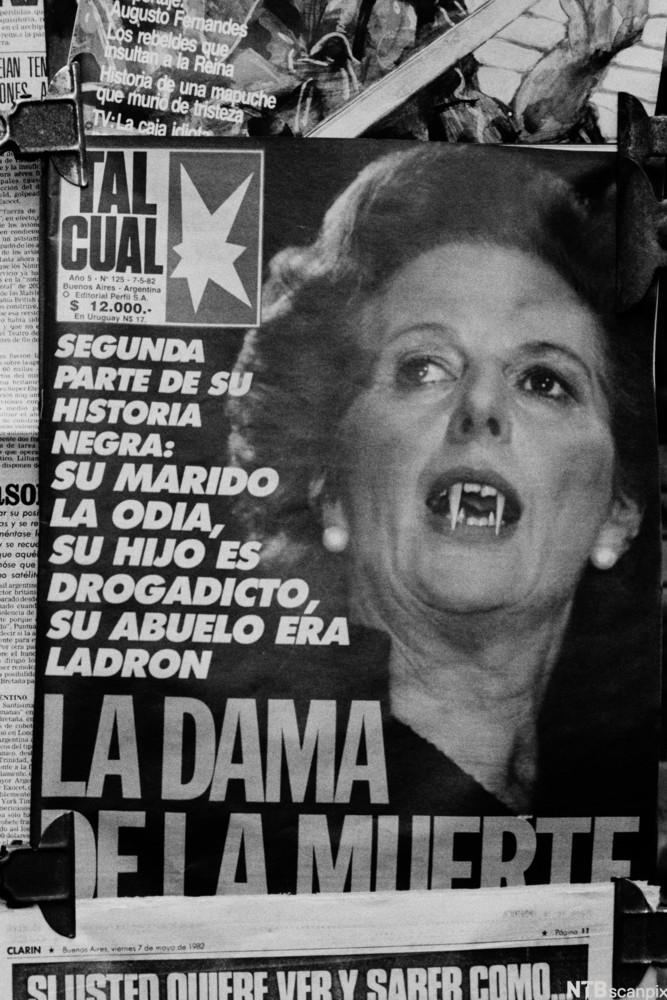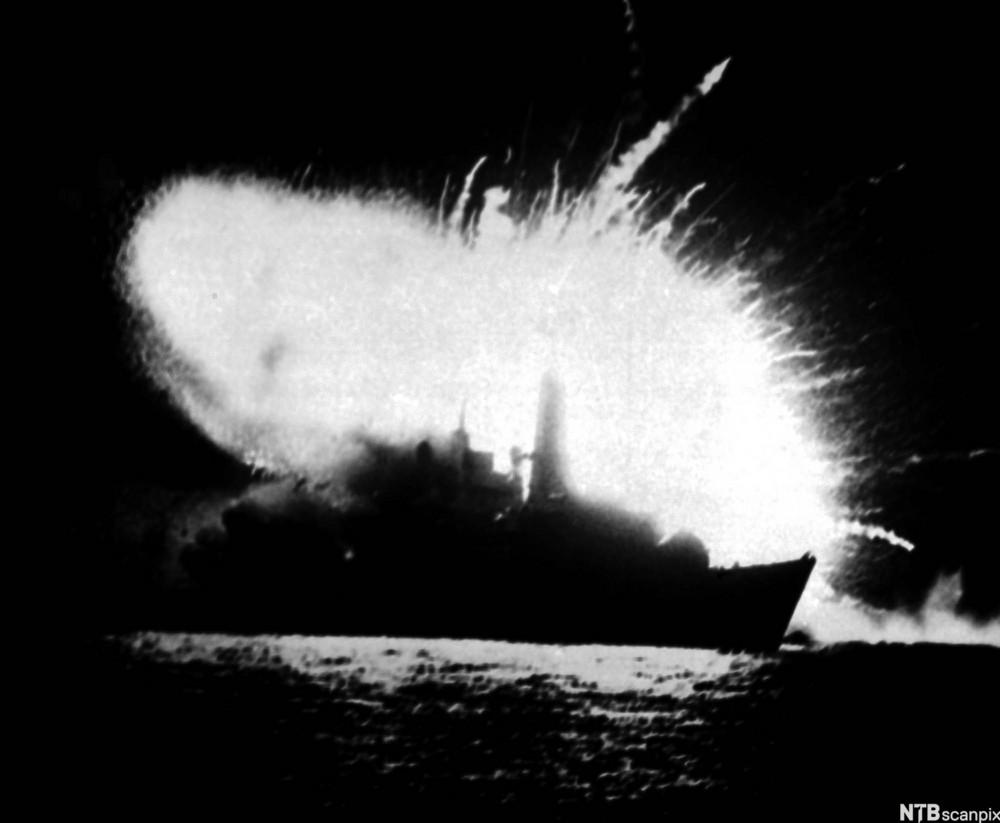
Vocabulary
jurisdiction, dispute, remnant, relic, proximity, self-determination, mount, dispatch, naval, amphibious, task force, vessel, contingency plan, ad-hoc, referendum, fend off, point-blank
Today, Britain is stripped of all colonial power and their strong political and military influence is gone. However, there are still 14 Overseas Territories that are under the jurisdiction of the United Kingdom1. All of these territories retain their relationship to the United Kingdom based on the free will of the people living there. They share the British monarch as Head of State, but they all have their own internal leadership, and most of them are self-governed.
A Few Facts about the Falkland Islands

- The Spanish name for the islands is the Malvinas.
- The Falkland Islands is one of 14 British Overseas Territories and consists of two large islands (West and East) and about 200 smaller islands.
- On East Falkland, you find the capital, Port Stanley, which claims to being the southernmost capital in the world.
- The islands are about 300 miles (480 km) off the coast of Argentina and about 8,000 miles (13,000 km) from Britain.
- The population is about 3000 (2008), almost all of British descent.
- The main economic activities are fishing and sheep farming.
- The primary export is wool and sheepskins.
- The islands also have a small tourist industry. About 40,000 cruise ship passengers arrive every summer mainly to see the penguins that breed there in millions.
- The islanders are financially self-sufficient in all areas except defense.
The Falkland Islands
The British Overseas Territories are all small and most of them are of no great political importance in the world today. However, one of these territories has in fact played an important role in international politics during the last 30 years: the Falkland Islands, a windswept group of islands in the South Atlantic Ocean.
The history behind the Falklands is quite complex. During the last 400 years, the group of islands has belonged variously to France, Spain, Argentina and Britain. The Falklands were claimed by the British in 1833, and a permanent British settlement was then established. Since then, the islands have been administered by Britain. However, the status of the Falkland Islands has long been disputed. Today, the isolated and sparsely populated islands remain the subject of a sovereignty dispute between Britain and Argentina, where they both claim jurisdiction over the islands. So, what is the core of the conflict and the competing claims?
Claimed by Argentina
Argentina has always claimed the islands for itself. They regard Britain's control of the Falkland Islands as the remnants of British imperialism and an absurd relic of a colonial past. Argentina argues that Spain acquired ownership of the Falklands / Malvinas, and upon its independence from Spain that title was automatically inherited by Argentina. There is no reason why the Falklands / the Malvinas should not be a part of Argentina today, since it has never renounced jurisdiction of the islands. Another important argument on which Argentina bases its claim is the islands' proximity to the Argentinian mainland.
Claimed by Great Britain
Britain, on the other hand, claims that the Spanish settlement withdrew in 1811, leaving the islands without inhabitants and any form of government. Britain has had jurisdiction over the islands since 1833, thus arguing its case on its long-term administration of the Falkland Islands. Moreover, the vast majority of the population is of British descent and many of them can trace their ancestors back to the very first settlers. Many of the islanders regard themselves as British citizens who just happen to live 8,000 miles away from their mother country. The principle of self-determination is important for the British; should the residents not be allowed to decide for themselves?
The Falklands War

On Friday, 2 April, 1982, the long-standing dispute over the sovereignty of the islands eventually resulted in an armed conflict between Britain and Argentina. After months of saber rattling Argentine forces mounted an attack on the Falkland Islands in order to retrieve the islands from the British. The islands were captured in two days, and the invasion led to a brief, but bitter war.
Britain responded by dispatching a naval and amphibious task force to retake the islands. The task force sailed from Portsmouth between April 5 and April 9, and the first elements of the fleet arrived on April 29. All in all, 28,000 British troops and 127 ships were involved in the operation. Argentina, on the other hand, had only about 12,000 soldiers on the islands and about 40 vessels. On May 2, the Argentine cruiser General Belgrano was sunk, killing 368, and this resulted in the first major loss of lives. Two days later, HMS Sheffield, a British destroyer was sunk, and 20 UK soldiers lost their lives.
After short, but fierce naval and air battles, British troops landed on the islands on May 21. By June 14, the Argentinian occupiers were forced to surrender. After only 74 days of conflict, the Falkland Islands were returned to British control, and on June 20, the British declared a formal end to military activity. All in all, 255 British and 649 Argentinian military personnel were killed. In addition, 3 Falkland Islanders died.

The attack came as a massive surprise to the United Kingdom and to British Prime Minister Margaret Thatcher. British officials had as early as 1976 predicted that the Argentinians might invade the islands, but in 1982 the attention of London was elsewhere. In fact, before the war few people in Britain even knew where the Falklands were located. Even former Defense Secretary John Nott admitted that he had to consult a globe in his office to find the exact geographical position of the islands. "I was a bit horrified to see how far away they were," he once said.2
In October 1982, only a few months after the war, Thatcher gave evidence to the Falkland Islands Review Committee and stated: " I never, never expected the Argentines to invade the Falklands head-on. I thought that it would be so absurd and ridiculous to invade the Falklands that I did not think it would happen."3 There was, in fact, no contingency plan to retake the islands in case of an attack. Britain was not prepared for a war and the plan can best be described as ad-hoc. Thatcher did indeed take a great chance when dispatching the task force for retaking the Falklands.
For Thatcher, the victory on the Falklands was more than a military victory, it also secured her victory in the parliamentary election that followed. Her political career was on the line, and she would most likely not have had a chance to win the next election if she had not managed to recover the islands. As it turned out, Margaret Thatcher – the Iron Lady – won a solid election victory in 1983, much due to the successful military actions on the Falkland Islands.
30 Years After the Conflict....
In 1990, diplomatic relations between the UK and Argentina resumed, but differences remained. Three decades after the Falklands War, tensions between the UK and Argentina have again resurfaced, and Argentina has become increasingly aggressive in its remarks about the islands. President Cristina Fernandez de Kirchner has repeatedly asked for discussions around ownership of the islands, but her demands have not been met. In 2010, a British company started searching for oil off the Falkland Islands, resulting in accusations against Britain for stealing Argentinian resources. The prospects of an oil boom is reviving the tension, and has strained the relationship between the two countries even further.
In January 2013, President Kirchner sent an open letter to Prime Minister Cameron which was published in several British newspapers, accusing the British government of "colonialism". 4 The letter sparked immediate reactions from Prime Minister Cameron, who made it very clear that he was not willing to peacefully hand back the Falklands to Argentina. He also stated that he would do everything he could to protect the islanders' desire to remain British. The future of the Falkland Islands should be determined by the Falkland Islanders themselves, and not by Argentina or Britain. Dr Barry Elsby, Member of the Legislative Assembly of the Falkland Islands, also responded to the letter stating that "We are not a colony. Our relationship with the United Kingdom is by choice".5
On March 11, 2013, this choice was made clear for the world to see as the Falklanders went to the polls giving their opinion on the matter in a referendum. This was to demonstrate that the locals remain solidly in support of British ties and to fend off aggressive Argentinian claims over the islands. They were asked to vote yes or no to the question: "Do you wish the Falkland Islands to retain their current political status as an Overseas Territory of the United Kingdom?" The referendum had a 92% turnout and the result was an overwhelming 99,8 % in favor of remaining British. Only 0,2% - 3 people - voted against British sovereignty.
Argentina, describing the voters as "implanted people", has responded by rejecting the referendum out of hand, claiming that it does not comply with international law. It has, according to Argentinian officials, "no value" and does not change the Argentinian position on this matter. Cameron responded, not surprisingly, in a far more positive way, stating that "the Falkland Islands may be thousands of miles away but they are British through and through and that is how they want to stay."6 However, according to Argentina, the question is about whether the territory is Argentine or British, not the people themselves.
With the discovery of potential oil reserves and the increasingly aggressive arguments between Britain and Argentina, speculation about a new armed conflict between the two countries has surfaced. In the eventuality of a new conflict, Britain will not be caught off-guard like they were in 1982, and a contingency plan is today in place. British officials have stated that in their opinion there is no credible military threat to the islands from the Argentine Navy or Air Force. However, they also add that "If there is a threat preparations would be made very quickly. We are confident that the Argentinians could not land even a fishing boat on the islands. But it's important to show we are serious about our obligations."7
References
1 UK Treaties
2 Britain pledges to defend distant cousins on Falkland Islands
3 Falklands invasion 'surprised' Thatcher
4 Cristina Fernández de Kirchner's letter to David Cameron
5 Falklands row: Cameron vows to defend Islanders
6 Britain pledges to defend distant cousins on Falkland Islands
7 Flashpoint Falklands